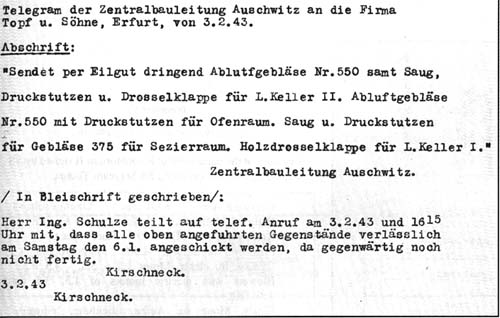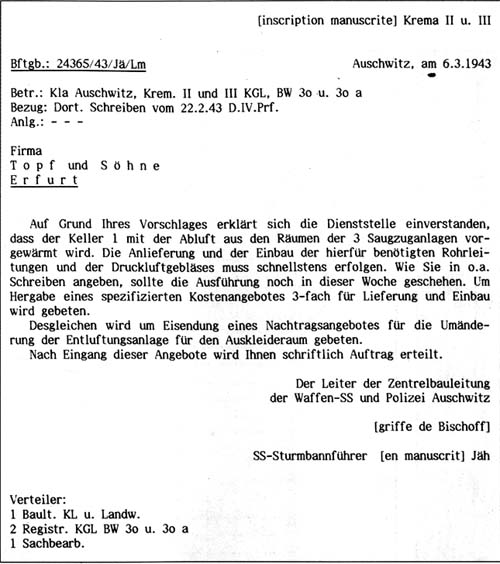|
|
 |
 |
AUSCHWITZ:
Technique
and Operation
of
the Gas Chambers © | |
|
| |
 |
Back |
 |
Contents |
Page 375 |
 |
Home
Page |
Forward |
 |
| |
 |
Document 35: |
|
Document 35:
[PMO file BW 30/27, page
55]
Telegram from the Auschwitz Central Construction
Management to Topf & Sons. Erfurt on 3rd February 1943. |
|
| |
|
Copy:
“Send urgently by express air extraction
blower No. 550 with suction and pressure connections and regulating
valve for C-cellar 2, air extraction blower No. 550 with pressure
connection for furnace room, suction and pressure connections for
375 blower for dissecting room, wooden regulating valve for C-cellar
1.” |
|
| |
|
| Auschwitz Central Construction Management |
|
| |
|
/written in pencil/
Engineer Schulze communicated by
telephone on 3rd February 1943 at 16.15 hours that all the above
items will be dispatched without fail Saturday, 6.1 [error, it
should be 6.2], for they are not yet ready. |
|
| |
|
| Kirschneck. |
|
| 3.2.43 |
|
| Kirchneck. |
|
|
| Document 36: |
 |
|
| |
Document 36:
[PMO, BW 30/25, page 7
(microfilm No. 1322] |
| |
|
| |
[handwritten by Kirschneck] Krema II & III
|
| |
|
| |
Correspondence register no 24365/43/Jä/Lm |
| |
Auschwitz, 6.3.1943 |
| |
|
| |
Subject: Auschwitz Conc. Camp, Kr II and
III POW camp, BW 30
and
BW 30a |
| |
Reference: Your letter of 22.2.43 D IV.Prf. |
| |
Enclosure: — |
| |
|
| |
Messrs
Topf & Sons
Erfurt
In accordance with
your suggestion, the Service agrees that cellar I should be
preheated with air coming from the rooms of the 3 forced draught
installations. The supply and installation of the ducting and the
blower necessary for this purpose must be effected as quickly as
possible. As indicated in your above-mentioned letter, this should
be done this week. We would ask you to send us a detailed quotation
for supply and installation in three copies.
Similarly we
would ask you to send a supplementary quotation for modifying the
air extraction installation of the UNDRESSING ROOM.
After receipt of these quotations we shall send a
written order. |
| |
|
| |
Head of the Auschwitz Waffen-SS and Police
of
the Central Construction Management
(initialed by Bischoff]
SS Major
[handwritten] Jäh[rling] |
| |
|
| |
Distribution:
1 Construction Management and Agriculture
2 Records POW camp BW 30 and 30a l
Official responsible
|
|
|
| In volume II of the Hoess trial a recapitulatory
report by Jan Sohn on the “NATURE OF THE DEVICES AND
INSTALLATIONS,” states: |
| |
“In the letter of 6th March 1943, No. 24365, a second
basement [was designated] as an undressing room
[Auskleideraum].” |
| |
| This letter contains two important “slips”:
|
| |
| 1. |
The mention of the recuperation
of hot air produced in the “Saugzuganlagen” [forced draught
installation] to preheat Leichenkeller I of Krematorium II.
It is not known whether this system was actually installed.
Even if it was, it would not have been able to operate very long as
the motors of the forced draught installations were soon out of
service, one of them having started a fire. These problems resulted
in the forced draught system of Krematorium III never even being
installed, while in Krematorium II it was removed and the rooms
converted into accommodation for the Sonderkommando. Obercapo August
allocated himself one room [see Henryk Tauber's testimony, Part III.
Ch 3] and the two remaining rooms were, it appears, converted as a
bathroom or shower room [with ten showers, according to Dr Nyiszli].
This document constitutes damning evidence. If, as the
revisionists claim, Leichenkeller I remained a “morgue” it would be
mad or stupid to want to “preheat” a place, by definition cool or
cold, destined for the temporary storage of corpses. Clinging to the
theory of the “typical morgue” without taking account of its
evolution, amounts to denying the authenticity of this letter.
“Preheating” makes sense only for a gas chamber using Zyklon-B,
where the temperature has to be raised to 27°C for the hydrocyanic
acid to evaporate. |
| 2. |
Request for a modification in
the UNDRESSING ROOM air extraction system.
This is a serious
“slip” and also constitutes additional proof that there were
ventilated undressing rooms in Krematorien II and III,
fitted with an air extraction system.
| |
| |
AUSCHWITZ:
Technique
and operation
of the gas chambers
Jean-Claude Pressac
© 1989, The
Beate Klarsfeld Foundation |
 |
Back |
Page 375 |
Forward |
 |
|

